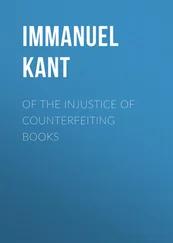Lastly, the question will arise in any one as if spontaneously, whether either concept be connate or acquired . The latter by what has been shown seems refuted already, but the former, smoothing the way for lazy philosophy , declaring vain by the citing of a first cause any further quest, is not to be admitted thus rashly. But beyond doubt either concept is acquired , not, it is true, abstracted from the sense of objects, for sensation gives the matter not the form of human cognition, but from the very action of the mind co-ordinating its sense-percepts in accordance with perpetual laws, as though an immutable type, and hence to be known intuitively. For sensations excite this act of the mind but do not influence intuition, neither is there anything connate here except the law of the soul in accordance with which it conjoins in a certain way its sensations derived from the presence of an object.
SECTION IV
ON THE PRINCIPLE OF THE FORM OF THE INTELLIGIBLE WORLD
Table of Contents
Those who deem space and time to be something real and the absolute bond, so to speak, of all possible substances in space, hold nothing else to be required in order to conceive how an original relation can belong to several existing things as the primitive condition of possible influence and the principle of the essential form of the universe. For since whatever exists is, according to their opinion, necessarily somewhere, it seems to them quite superfluous to inquire why things are present to one another in a certain manner, since this is of itself determined by the universality of all-comprehending space. But this concept, besides relating as has been shown rather to the sensuous laws of the subject than to the conditions of the objects themselves, even granting it the greatest reality, still denotes nothing but the intuitively given possibility of universal co-ordination, leaving undealt with the question solvable only by the intellect: In what principle does this very relation of all substances rest, which intuitively regarded is called space? The question of the principle of the form of the intelligible world turns, therefore, upon making apparent in what manner it is possible for several substances to be in mutual commerce , and for this reason to pertain to the same whole, which is called world. We do not here consider the world, let it be understood, as to matter, that is, as to the nature of the substances of which it consists, whether they be material or immaterial, but as to form, that is to say, how among several things taken separately a connection, and among them all, totality can have place.
Several substances being given, the principle of their possible intercommunication is not apparent from their existence solely , but something else is required besides from which their mutual relations may be understood. For on account of mere existence they are not necessarily related to anything, unless it be to their cause; but the relation of an effect to the cause is not intercommunication, but dependence. Therefore, if any commerce intervenes among them, there is need of an exactly determining specific reason.
The sham cause in physical influence consists in rashly assuming that the commerce of substance and transitive forces is sufficiently knowable from their mere existence. Hence it is not so much a system as rather the neglect of all philosophical system as a superfluity in the argument. Freeing the concept from this defect, we shall have a species of commerce alone deserving to be called real, and from which the whole constituting the world merits being called real, and not ideal or imaginary.
A whole from necessary substances is impossible . For, since the existence of each stands for itself without dependence on any other, a dependence which in necessary substances clearly cannot befall, it is plain that not only does the intercommunication of substances (that is, the reciprocal dependence of their states) not follow from their existence, but as necessary substances cannot belong to them at all.
The whole, therefore, of substances is a whole of contingent things, and the world consists essentially of only contingent things . Besides, no necessary substance is in connection with the world except as a cause with the effect, and, therefore, not as a part with its complements making up a whole, since the bond connecting parts is mutual dependence, which in a necessary being cannot occur. The cause, therefore, of the world is an extramundane being, and so is not the soul of the world, nor is its presence in the world local, but virtual.
The mundane substances are beings from, another being; not from several, but all from one . For, suppose them to be caused by several necessary beings. In intercommunication there are not effects from causes alien to all mutual relation. Hence, the unity in the conjunction of the substances of the universe is the consequence of the dependence of all on one . Therefore, the form of the universe witnesses the cause of matter, and only the sole cause of all things is the cause of the universe , nor is there an architect of the world not at the same time its creator .
If there were several primary and necessary causes together with their effects, their works would be worlds , not a world , since they would in no wise be connected into one whole. And vice versa, if there be several actual worlds without one another, several primary and necessary causes are given, so, however, as to give intercommunication neither to one world with another, nor to the cause of one with the world caused by another.
Several actual worlds without one another are not , therefore, impossible by the very concept , as Wolf hastily concluded from the notion of a complex or multiplicity which he deemed sufficient to a whole, as such, but only on condition that there exist but one necessary cause of all things . If several are admitted, several worlds without one another will be possible in the strictest metaphysical sense.
If, as we validly conclude from a given world to a single cause of all its parts, we may similarly argue reversely from the given cause common to all to their interconnection, and hence to the form of the world—though I confess this conclusion does not seem as plain to me—then the primary connection of substances will not be contingent but by the sustentation of all by the common principle , necessary, and hence the harmony proceeding from their very subsistence founded in a common cause would proceed according to the usual rules. Such a harmony I term established generally; as that which does not take place except as far as any individual states of a substance are adapted to the condition of another is harmony established particularly; the communion by the former being real and physical , by the latter ideal and sympathetic . All communion, then, of the substance of the universe is eternally established by the common cause of all, and either established generally by physical influence—as amended; see paragraph 17—or adapted particularly to their states; and the latter either rests originally in the primary constitution of every substance or is impressed on the occasion of any change whatever; the first being called pre-established harmony , the latter occasionalism . If, then, on account of the sustentation of all substances by one, the conjunction of all constituting them a unit be necessary , the universal commerce of substances will be by physical influence , and the world a real whole; if not, the commerce will be sympathetic, that is a harmony without true commerce, and the world only an ideal whole. To me the former, though not demonstrated, appears abundantly proved by other reasons.
Читать дальше












